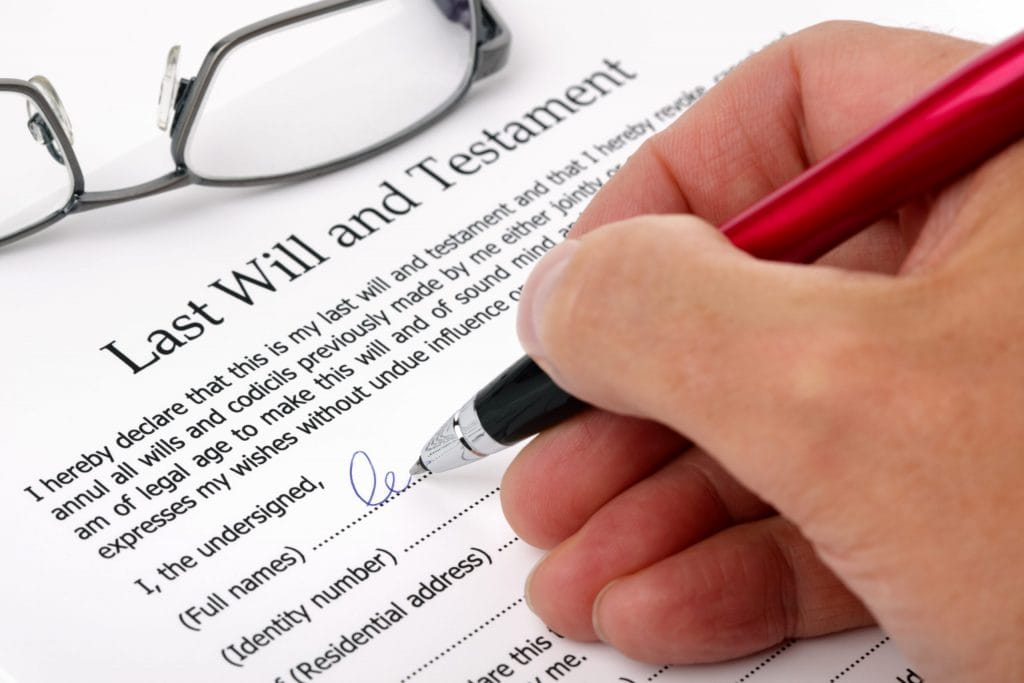Having a will that is kept up-to-date is vital if your assets are to be given to the people you want them to after you pass away. There are important reasons to make a will, as it protects your legacy and ensures your wishes are followed after you pass away. Not having a will in place, or not regularly updating it, can leave your estate in limbo and your loved ones without the assets you have worked hard to provide them with.
In this article, we look at why wills are an important part of home ownership and how to ensure you are keeping yours up-to-date.
What does a will do?
A will is a legally binding document that sets out how the person creating the will wants their money, property, possessions, and even digital assets to be distributed after their death. Beyond simply dividing assets, a will allows you to appoint executors who will manage your estate, designate guardians for your children, and outline specific wishes such as charitable donations or funeral arrangements.
Deciding on key aspects like who will serve as executor, who will be the guardian for your children, and how your specific wishes are carried out is essential to ensure your intentions are honoured. In short, a will gives you control over your legacy, ensuring that the people and causes you care about are provided for in the way you intend.
What happens if you do not have a will?
If you die without having a will in place, certain rules automatically apply to the distribution of your estate. You are classed as having died ‘intestate’, which means your assets are left to a default recipient as set by the law. This means your family will not have a say in how your assets are divided, which could leave some people without their intended inheritance.
For example:
- If you are not married or in a civil partnership, your partner may inherit nothing, even if you lived together for decades.
- If you have children, they may inherit equally, regardless of your personal preferences.
- If you have no children or spouse, your estate may pass to surviving parents, siblings, or distant relatives, rather than close friends or chosen beneficiaries.
- If you have not updated your will or do not have one, an ex partner could inherit from your estate.
The only way to ensure your assets go where you want is to have a legally valid will.
Introduction to making a will
Making a will is essential for protecting your estate and ensuring your final wishes are respected – a crucial step in dealing with your assets and property after you die. It allows you to decide what happens to your money, property, and other assets, giving you control over your legacy and the lives of your loved ones.

A will is a legally binding document that must be written and witnessed in a specific way to be considered legally valid, making it important to understand the process and seek professional will writing services if needed.
By having a will, you can avoid intestacy rules, which may not align with your wishes, and ensure that your assets are divided according to your desires, rather than being divided equally among your surviving relatives.
Making a will is an essential part of estate planning. It allows you to:
- Decide what happens to your property, money, and possessions.
- Avoid the rigid intestacy rules that may not reflect your wishes.
- Provide clarity and security for your loved ones during a difficult time.
To be legally valid, a will must follow specific legal requirements, including being signed in the presence of two witnesses, who must also sign the document. The person making the will must be of sound mind, meaning they are mentally competent and fully aware of the nature of the document and the assets and beneficiaries involved.
While not strictly required, having a dated will helps confirm when the document was signed and can be crucial in establishing its validity and order if there are multiple documents. For this reason, many people choose to seek professional will-writing services to ensure their will is watertight.
The importance of having a will
Having a will is vital for protecting your family members, especially minor children, and ensuring they are well cared for in the event of your death – a difficult time that can be made easier with a clear and legally valid will.
It allows you to choose an executor to manage your estate, making the process of dealing with your affairs easier for your loved ones and reducing the risk of disputes and challenges to the will. You can appoint a trusted family member as an executor or guardian to ensure your wishes are carried out and your children are cared for by someone you trust.

A will can also help you avoid leaving a previous partner or ex-spouse as a beneficiary, which could happen if you die without a will or without updating your existing will after a divorce or separation. Without a will, children from a previous relationship may not be protected or may be unintentionally excluded from inheriting your estate.
Additionally, having a will can help you leave a gift or assets to specific beneficiaries, such as unmarried partners or friends, who may not automatically inherit under intestacy rules.
A will is about more than dividing assets—it is about protecting the people who matter most to you. Key benefits include:
- Protecting your family – You can name guardians for minor children, ensuring they are raised by people you trust, such as a family member.
- Choosing your executor – This makes it easier for your loved ones to manage your estate.
- Preventing unintended inheritance – Without a will, an ex-spouse, estranged relative, or children from a previous relationship could still benefit or be left out.
- Providing for partners and friends – Unmarried partners or friends are not recognised under intestacy rules but can be included in a will.
The benefits of writing a will
Writing a will can help you save time and reduce stress for your loved ones after you die, making it an important consideration for anyone looking to protect their legacy and ensure their final wishes are respected. There are also free resources and services available that can help individuals create a will at no cost.
It can also help you create situations where your assets are transferred to your beneficiaries quickly and efficiently, without the need for probate service or lengthy legal battles.
By making a will, you can choose executors and guardians for your minor children, giving you control over who will care for them and manage their inheritance.
Furthermore, having a will can help you avoid inheritance tax and ensure that your assets are passed on to your loved ones in a tax-efficient manner, making it an important consideration for anyone looking to minimize their tax liability.
Writing a will brings peace of mind—for you and your loved ones. Some of the most significant benefits include:
- Reducing stress for your family – A clear will avoids disputes and uncertainty.
- Efficient transfer of assets – Probate is simpler and faster when a will is in place.
- Guardianship and inheritance planning – You decide who cares for your children and how their inheritance is managed.
- Tax efficiency – A well-drafted will can help reduce inheritance tax, ensuring more of your estate goes to your loved ones.
Protecting Your Legacy
A will is an essential tool for protecting your legacy and ensuring that your assets are passed on to your loved ones in the way you want, making it a crucial step in estate planning. By making a will, you can ensure that your digital assets, such as social media accounts and online storage, are handled in the same way as your physical assets, and that your final wishes are respected.
A will can also help you leave a lasting legacy and make a positive impact on your community, by leaving gifts or assets to charities or other organizations. Additionally, having a will can help you accept death as a part of life and ensure that your loved ones are well cared for after you’re gone, giving you peace of mind and security.
A will is one of the most powerful tools for protecting your legacy. It allows you to:
- Decide how digital assets (social media accounts, online storage, digital currencies) are managed.
- Leave charitable gifts, supporting causes that are meaningful to you.
- Ensure that your estate reflects your values, not just legal defaults.
- Give peace of mind that your loved ones will be provided for according to your wishes.
Key considerations when writing a will
When writing your will, consider who will inherit your assets, who will act as executor, and how debts and taxes will be paid. It’s also important to specify arrangements for your pets and other important matters, as without clear instructions, they may be dealt with by authorities according to local laws, which could result in outcomes you might not want, such as pets being re-homed or sent to shelters.
Within your will, you have the power to decide how all your affairs are handled, from providing for minor children and family members to leaving assets to other beneficiaries, such as friends, charities, or your civil partner. If you are in a civil partnership or have an unmarried partner, a will is especially important, as the law does not automatically pass your estate to your other half unless you specify it in a legal document.

Life changes—such as marriage, divorce, the birth of a child, or acquiring new property—can all impact your estate. That’s why it’s essential to review and update your will at the earliest opportunity after any major event. Updating your will, or creating a new will, ensures that previous relationships or previous wills do not create situations where your assets are not distributed as you intend.
Choosing trustworthy executors and making sure your will is signed and witnessed in the same way as your original will are crucial steps to ensure your final wishes are respected. Professional will writing services can help you navigate complex issues, such as inheritance tax planning, digital assets, and the needs of blended families, saving time and reducing stress for your loved ones.
Don’t leave your family members to deal with the difficulties that arise when you die without a will. By taking action now, you can create situations that are easier for your loved ones to manage, avoid unnecessary legal complications, and ensure your estate is handled exactly as you wish.
Whether you need a simple will or more comprehensive estate planning, professional writing services can guide you through the process, making sure your will is tailored to your needs and remains legally binding. Remember, a will is not just a legal document—it’s a way to provide for your loved ones, protect your legacy, and give yourself peace of mind.
Considerations for Your Estate
Creating a will involves more than simply deciding who inherits what. A thoughtful approach helps ensure your wishes are honored and your loved ones are protected. Start by taking stock of your assets and debts, and remember that some accounts, like retirement plans or insurance policies, may pass directly to named beneficiaries, regardless of what the will says. If you have children or dependents, naming a guardian is essential to avoid court intervention.
Choosing an executor you trust is another key step, since this person will manage the estate, settle obligations, and carry out your instructions. You’ll also want to factor in taxes, probate costs, and administrative expenses, which can affect what your beneficiaries ultimately receive. Finally, review your will regularly and update it as life changes occur, such as marriage, divorce, new children, or significant changes in wealth, so your plan remains accurate and effective.
Personal and Family Considerations
Beyond financial matters, a will also reflects deeply personal choices. Deciding how to provide for loved ones requires careful thought about relationships, needs, and long-term well-being. If you have minor children, naming a guardian is one of the most important decisions you’ll make, ensuring they are cared for by someone you trust. For adult beneficiaries, you may wish to consider their financial maturity, health, or unique circumstances when determining how and when they inherit.

Family dynamics also play a role. Clear, transparent instructions can help minimize conflict among heirs and reduce the likelihood of disputes. In blended families, for example, special attention may be needed to balance the interests of a current spouse with those of children from a previous relationship. It is also wise to communicate your intentions in advance where possible, so loved ones understand your decisions.
By addressing these personal and family factors, your will can provide both financial security and peace of mind, reflecting not only your assets but also your values and priorities.
Protecting your pets in your will
For many people, pets are family, and ensuring their well-being after your death is an important part of estate planning. Because the law generally views animals as property, you cannot leave money directly to a pet. However, you can use your will to name a trusted caregiver and provide resources for their ongoing care. This may include leaving funds to the caregiver with clear instructions on how they should be used, or establishing a pet trust if your state allows it.
When choosing a caregiver, consider factors such as their ability to provide long-term care, their lifestyle, and their willingness to take on the responsibility. It’s also wise to name an alternate in case your first choice is unable to serve. Including details about your pet’s needs, diet, medical conditions, or daily routines, can further ease the transition.
By planning ahead, you can ensure your pets continue to receive love and attention, offering peace of mind that they’ll be cared for just as you would have wished.
How often should a will be updated in the UK?
In general, it is recommended that you check and update your will every five to ten years, or after any major change to your life. For example, if you get married or divorced you should ensure your will reflects this change of circumstance so you can add or remove beneficiaries as you wish. Other life changes that may affect your will include: the birth of children or grandchildren, changes in your finances, changes in the relationships between family members, or the death of any beneficiaries or executors
It is recommended to review your will every five to ten years or after major life changes, such as:
- Marriage or divorce (which can revoke or alter inheritance rights).
- Birth of children or grandchildren.
- Changes in financial circumstances (new property, investments, or business interests).
- Death of a beneficiary or executor.
Regular updates keep your will relevant and legally effective.
Will writing support & services
While some people choose to draft their own will, many turn to will writing services for guidance and reassurance. These services range from simple online platforms to full legal support from solicitors or estate planning professionals. The right choice often depends on the complexity of your estate and your personal circumstances.

Online and DIY services can be cost-effective and suitable for straightforward situations, for example, leaving everything to a spouse or a single beneficiary. However, more complex estates, such as those involving business ownership, blended families, overseas assets, or trusts, usually require professional advice. In these cases, working with a solicitor or estate planning specialist can help ensure your will is valid, comprehensive, and tailored to your needs.
Whichever route you choose, it’s important to ensure the service is reputable, transparent about costs, and provides clear instructions for proper signing and witnessing. A poorly drafted or invalid will can create confusion and disputes, undermining the very protection you set out to provide.
Will writing advice at Bower Home Finance
Creating a will is one of the most responsible and empowering steps you can take to secure your legacy and protect your loved ones. No matter your age or life circumstances, having a legally valid will ensures that your assets, property, and digital assets, including social media accounts, are distributed according to your wishes, not left to be divided equally under intestacy rules.
At Bower Home Finance, we understand that writing a will can feel daunting. Our team provides tailored support to help you create or update your will, ensuring it reflects your wishes and offers protection for your loved ones. From choosing executors to addressing inheritance tax planning, we guide you through the process with clarity and care.
By seeking professional advice and keeping your will up to date, you can have confidence that your estate will be managed exactly as you intended, providing peace of mind both now and in the future.
Take control of your future today and speak with our specialist team about writing or updating your will.



